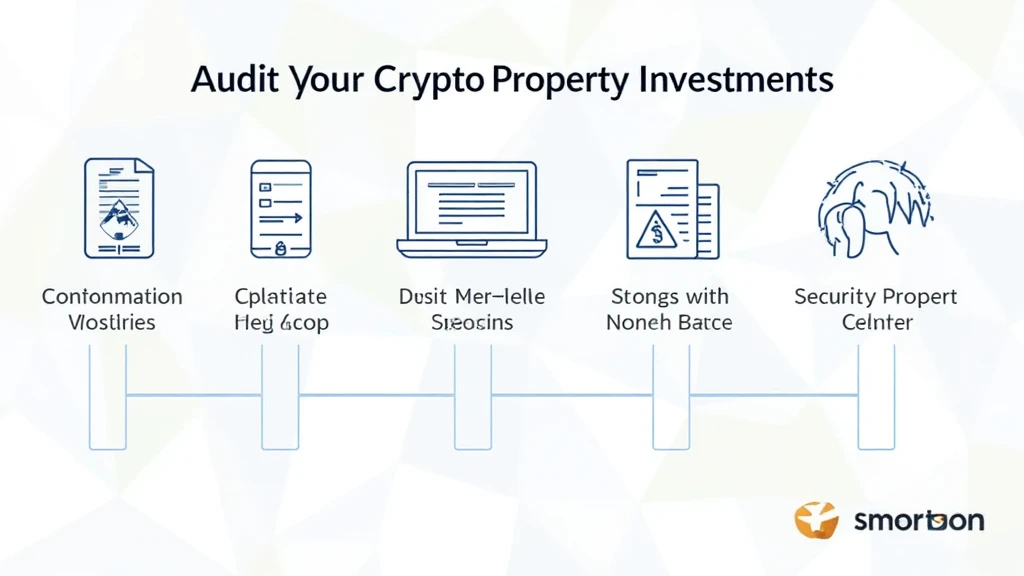How to Audit Crypto Property Investments: A Detailed Approach
In the rapidly evolving world of cryptocurrencies, the significance of auditing crypto property investments cannot be understated. With the losses from DeFi hacks surging to $4.1 billion in 2024 alone, it’s imperative for investors to ensure that their holdings are secure and properly validated. This guide sheds light on the essential steps and methodologies you should adopt to audit your crypto investments effectively.
Understanding the Basics of Crypto Property Investments
Crypto property investments refer to the accumulation of digital assets such as cryptocurrencies, tokens, and NFTs (Non-Fungible Tokens). To excel in auditing these investments, it’s crucial to grasp both the potential rewards and inherent risks involved. For instance, factors like market volatility and regulatory challenges can impact the security and authenticity of these assets.
Identifying Asset Types
- Cryptocurrencies: Bitcoin, Ethereum, and altcoins.
- Tokens: Utility tokens, security tokens, and stablecoins.
- NFTs: Unique digital assets representing ownership of art, music, or virtual real estate.
The Importance of Regular Audits
Just like traditional property investments require regular valuations, so do crypto assets. Regular audits help in:

- Verifying asset existence and ownership.
- Identifying discrepancies or potential fraud.
- Ensuring compliance with evolving regulations.
Step-by-Step Guide to Auditing Crypto Investments
Now that we’ve established what crypto property investments are, let’s delve into how you can effectively audit these assets.
Step 1: Assemble Your Documentation
Gather all necessary documentation, including transaction records, wallets, and relevant contracts. This will provide a solid foundation for your audit process.
Step 2: Utilize Blockchain Explorers
Employ blockchain explorers to verify the existence and ownership of your assets. A blockchain explorer functions like an online ledger, allowing you to trace transaction histories in real-time. Popular explorers include:
- Blockchain.com: For Bitcoin transactions.
- Etherscan: For Ethereum-related assets.
- Tokenview: A multi-chain explorer.
Step 3: Analyze Your Wallet Security
Evaluating the security of your digital wallets is paramount. Check for:
- Strong password protocols.
- Two-factor authentication (2FA) implementation.
- Cold wallet usage for long-term asset holding.
Step 4: Assess Your Investment Strategy
Analyze your investment strategy and portfolio diversification. Ensure that your investments align with your risk appetite and long-term financial goals.
Common Challenges in Auditing Crypto Investments
Auditing crypto investments comes with unique challenges, including:
- Market Volatility: The unpredictable nature of crypto prices can complicate valuations.
- Regulatory Compliance: Keeping abreast of local regulations, such as tiêu chuẩn an ninh blockchain, can be daunting.
- Technical Complexity: Understanding blockchain technology and smart contracts is essential for thorough audits.
Tools and Resources for Effective Auditing
Leverage the following tools to streamline your auditing process:
- Ledger Nano X: Reduces hacks by 70% with enhanced security features.
- CoinMarketCap: To monitor market trends and asset valuations.
- Audit firms: Consider hiring services like hibt.com for professional auditing and compliance measures.
Conclusion
In summary, auditing your crypto property investments is a vital process that can safeguard your digital assets against potential risks and ensure compliance with the law. With a structured approach, understanding of the tools available, and a keen eye for detail, you can navigate the complexities of crypto investment auditing. Remember, it’s not just about identifying what you own, but also confirming that it’s secure and aligned with your financial objectives. To stay ahead in the evolving landscape, embrace regular audits as part of your investment strategy. For more insights, follow us on bitcoincashblender.
Author: Dr. John Doe, an industry expert with over 10 published papers on blockchain security, has led several high-profile auditing projects for leading cryptocurrency entities.












